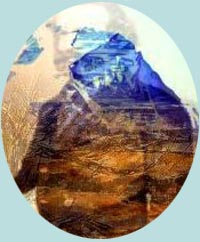On land constantly shifting, a trekker may build a shelter for one night
only where the path leaves itself roofless, a bleak sentinel stripped
bare, landscapes pulverize traditional representation—shearing forms, upending
spatial expectations and strewing compositions with obstacles that block easy
entry. The eye must climb up or down, or squeeze past tilted planes, jutting
shapes and unexpected solidities; it must reconcile monumental geo-
logical facts with one stone wall graffitied JR—
What culture circles to our left, to our right,
beneath our feet? Life in its various stages
of decay. Is this what happens when we,
what happens when we see our selves?Rae learned from a band of Inuit the plight of the lost Franklin Expedition, for whom there were several search parties plying the Arctic. The Inuit gave him a description of corpses they had found in tents, apparently dead from starvation, a few others scattered around the camp. They also gave him "artifacts, including cutlery, watches and a medal belonging to Franklin himself," darkening into remnants of human flesh found in the expedition's kettles.
He returned to England without having seen the site personally, and "British society refused point blank to believe that 'right next to it there's an empty space, because that was something he didn't know yet. He only made what he knew, nothing else.' 'What a good conscience he must have had,' I said. 'Oh yes: he was happy, somewhere deep inside men of the Royal Navy would or could in any extremity of hunger alleviate that pain of starvation by this horrible means, namely cannibalism." Lady Franklin launched a media campaign denouncing Rae, to save her husband's reputation from a history of morbidity; yet, this morning's clouds are red as a sea of skinned salmon.
27January 2006www.orkneyjar.com/history/historicalfigures/
johnrae/index.htmlhttp://www.bbc.co.uk/dna/h2g2/A6566547R.M. Rilke, Letters to Cézanne. New York, 1985."They used to make qarmat from either stones or sod. From the time of my childhood I could remember the time when they would make the same qarmaq over and over again. The walls did not fall easily but the upper section would." C.A. Arnatsiaq. In, Uqalurait: An Oral History of Nunavut. Montreal, Canada, 2004.
